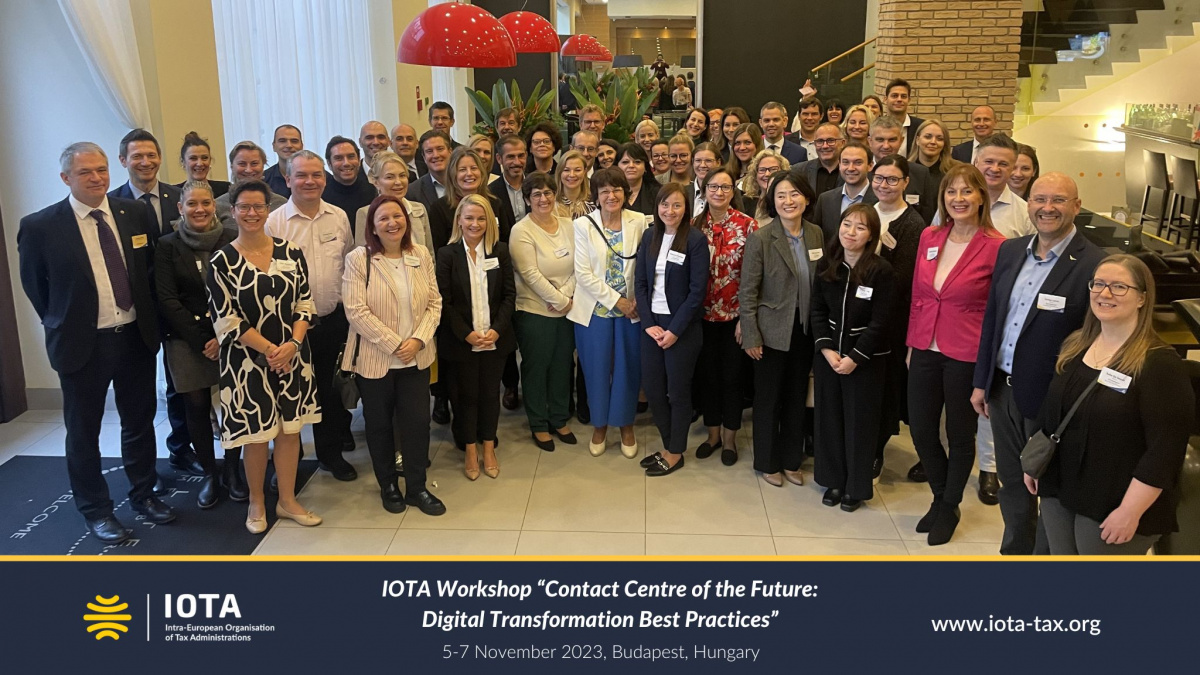This week, IOTA had the pleasure of hosting the second fully face-to-face technical activity of its 2023 Work Programme, the IOTA Workshop “Contact Centre of the Future: Digital Transformation Best Practices”. The event took place from 7-9 November in Budapest, Hungary and brought together 58 tax officials from 29 IOTA member administrations. It was an absolute pleasure seeing some familiar and lots of new faces in the conference room, especially as the last in-person meeting relating to this activity happened in 2019 - just before the outbreak of the COVID-19 pandemic.
Contact Centres are normally the first point of contact for anybody who wants help with their tax affairs, whether that is personal tax liability, help with returns, claims, tax debts, VAT rules, or any other tax issues. They are also the primary point of contact for tax agents who are looking for definitive advice on their clients’ affairs. So the efficiency of a Contact Centre and the quality of the advice given make a huge difference to the reputation of a tax administration, as well as impacting the timeliness and accuracy of tax declarations and payments.
This IOTA workshop allowed IOTA member tax administrations to learn more about strategies and approaches members have taken, or are looking to take, in digitally transforming their service delivery to taxpayers in order to create Contact Centres of the Future. The activity was a mix of presentations and Q&A in plenary along with the sharing of experiences, and ideas.
On the first day, a series of introductory presentations set the context for more in-depth discussions on contact centres transitioning to new technologies. During this session, Jonathan Heath and Eugenijus Soldatkovas from the IOTA Secretariat provided a short overview of the findings from Country Profiles. It was a great pleasure to also welcome the European Contact Centre and Customer Service Exchange’s Research Manager, Stephen Yap, who spoke about the “Evolution of the Contact Centre” and delivered a fascinating presentation.
Following on from this, workshop participants looked at how contact centres intend to operate going forward, exchanged experiences of differing strategic approaches to contact centres together with a look at as well as learning more about hybrid working models, including the challenges and opportunities, managing hybrid workers, and keeping employees engaged. The following IOTA member tax administrations covered these topics:
- Romania: “Redesigning the future of Contact Centres – The Romanian approach” presented by Mihaela Dragulin;
- Georgia: “Development of Remote Services” presented by Teona Tchulukhadze;
- Switzerland: “Change Management: The Swiss Approach” presented by Chantal Sauber;
- Austria: “Hybrid Working and use of technology in Contact Centres” co-presented by Ernst Siller & Susanne Pack;
- Norway: “Does one size fit all? Why hybrid working enhances flexibility, employee engagement and customer satisfaction” co-presented by Daniel Bernstein & Elle Stina Elstad.
With the use of recent advances in technology, tax administrations are looking to solve some of the problems that Contact Centres face in trying to provide a quality service to taxpayers. Intelligent implementation of technological solutions drives down contact by helping taxpayers to self-serve instead of turning to the telephone as their first option, thus helping to speed up response times for those who cannot self-serve. Use of AI can provide rapid answers without the need for contact with a Contact Centre agent. IT solutions can be used to prompt taxpayers and give proactive advice before the taxpayer realises there is an issue, providing a better service and saving resources. The second day particularly focused on these aspects by looking at tax administrations’ approaches to evolving technology such as using AI technology & Chatbots, Mobile and other channels, and Cloud and Agile services. During the plenaries, several country presentations showcased how the use of these new digital technologies can impact Contact Centres and their operations. Numerous IOTA member countries reflected the subject:
- Spain: “Use of chatbots in tax assistance” presented by Ana Fernandez Daza;
- United Kingdom: “AI in a contact centre environment” presented by Lee Hawksworth (joined online);
- Ireland: “An evolving approach to Contact Centre Delivery” presented by Vincent Duffy;
- The Netherlands: Use of different channels to optimise the customer experience” presented by Matthijs Van Der Velden;
- Portugal: “Contact Centre in the Cloud” presented by Antonio Neves Lopez (joined online);
- Lithuania: “Robotisation of processes” presented by Martynas Endrijaitis;
- Latvia: “Capital Gains wizard” presented by Galina Salkovska.
Thursday’s closing sessions pulled together the discussions from the previous two days and explored how IOTA member Tax administrations are using innovative technology and data analytics to manage contact centre agents' performance and analyse and react to customer behaviour. At this session, Aušra Davidavičienė from Lithuania brought an insightful presentation on “Quality Assurance and Performance Monitoring” to the plenary.
This was followed by a panel debate featuring Ana Fernandez-Daza (Spain), Dr Martynas Endrijaitis (Lithuania), Matthijs van der Velden (The Netherlands) and Ernst Siller (Austria). They discussed emerging technology trends and talked about how tax administrations can try to future-proof their contact centres and offer a more proactive service. Finally, the workshop participants considered the expectations they had set out at the start of the event and whether they had been met, as well as offering ideas as to how the subject could be taken forward in future.
All the materials and presentations are now available online on the event’s webpage. This Workshop was led by the IOTA International Taxation Expert Jonathan Heath and supported by the IOTA Work Programme Manager Eugenijus Soldatkovas and took place in Budapest, Hungary.

